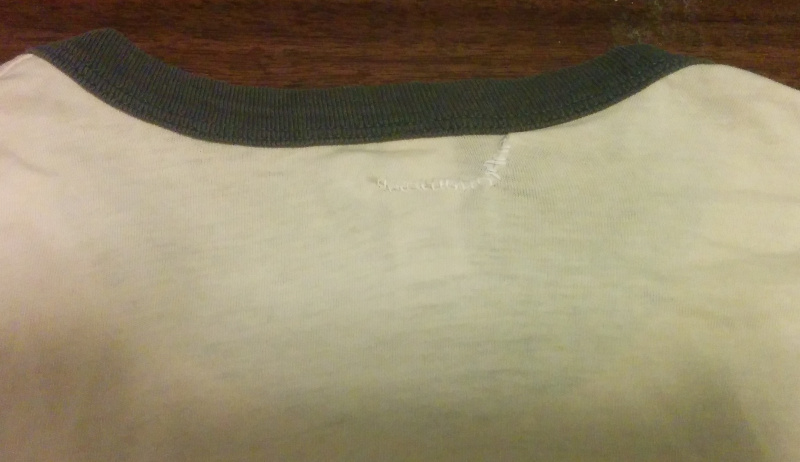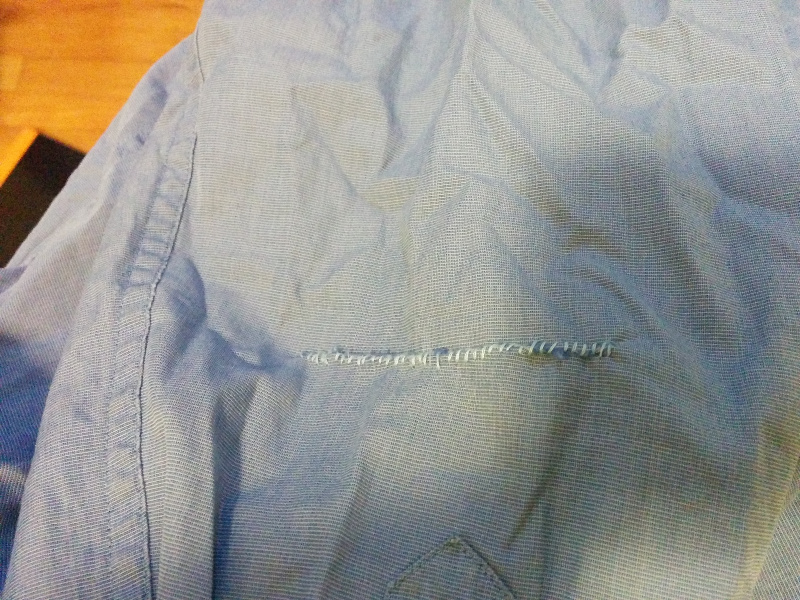-----BEGIN PGP SIGNED MESSAGE----- Hash: SHA512
by Javantea
Dec 27, 2015
Today I sewed two holes in two shirts. Both shirts have survived a long time but both had become unwearable. By coincidence both shirts were a few sizes too small. Both shirts were worn hundreds of times despite not being the perfect shirt for the task and that is certainly the reason why they came apart after so many years of service. The blue work shirt was made in India in the previous decade and sold by Gap with their brand on it. My brother bought me it so that I would have one dress shirt that I could wear it to interviews. The white ringer was made in Los Angeles by good ol' American Apparel in the previous decade. I bought it from Scarecrow Video in Seattle in the early 2000's. Both are probably a decade old at least. Vintage surely.
How difficult was it to sew the shirts? Both shirts took me more than an hour. At minimum wage, I could have earned $8, which would not pay for one new shirt let alone two. At the rate I charged six years ago, $25, I could have earned about enough for one t-shirt. At a lawyer's rate, though I could have hired someone to buy a tailored Brooks Brothers shirt and deliver it to me in the time it took me to mend them. Since I was having it tailored, I could have them remove the obnoxious tags and add a sweet modification if I so desired. But here's why you should repair instead of replace:
- Where did that new shirt come from?
- Are you going to take the old shirt to Value Village?
- Will they be able to sell it for a quarter?
But wait, you say, "I buy my shirts from upstanding fair-trade retailers like The Gap, REI, Nordstroms, Costco, and Walmart." Sure, sure you do, but have you paid enough money for those companies to be thorough and ensure that independent investigators actually agree with their assessment? If you are like me, the answer is simply no. Sweatshops, wage slavery, and the Foxconn fubar are the result of people with money buying things from retailers, importers, wholesellers, and mail order who cut costs to the point of immorality. If those with money decided that they'd rather sew than buy at any retailer -- good or bad, the moral dillemma of whether you are held to blame for indirect slavery goes entirely out the window. That argument is long and baffles even the most opinionated philosophers. That's not to say that the day you give away all your clothes and buy ridiculously expensive fair-trade clothes you are forgiven, but that once you've taken responsibility for past transgressions and started anew you can honestly say that you've turned a new leaf. If this new leaf involves wearing old clothes that have been patched, repaired, and are sometimes simply ugly in certain fashion, then everyone will benefit from it. Thoreau's Walden explains this neatly in the beginning of the book.
Every day our garments become more assimilated to ourselves, receiving the impress of the wearer's character, until we hesitate to lay them aside without such delay and medical appliances and some such solemnity even as our bodies. No man ever stood the lower in my estimation for having a patch in his clothes; yet I am sure that there is greater anxiety, commonly, to have fashionable, or at least clean and unpatched clothes, than to have a sound conscience. But even if the rent is not mended, perhaps the worst vice betrayed is improvidence. I sometimes try my acquaintances by such tests as this—Who could wear a patch, or two extra seams only, over the knee? Most behave as if they believed that their prospects for life would be ruined if they should do it. It would be easier for them to hobble to town with a broken leg than with a broken pantaloon. Often if an accident happens to a gentleman's legs, they can be mended; but if a similar accident happens to the legs of his pantaloons, there is no help for it; for he considers, not what is truly respectable, but what is respected. We know but few men, a great many coats and breeches. Dress a scarecrow in your last shift, you standing shiftless by, who would not soonest salute the scarecrow? Passing a cornfield the other day, close by a hat and coat on a stake, I recognized the owner of the farm. He was only a little more weather-beaten than when I saw him last. I have heard of a dog that barked at every stranger who approached his master's premises with clothes on, but was easily quieted by a naked thief. It is an interesting question how far men would retain their relative rank if they were divested of their clothes. Could you, in such a case, tell surely of any company of civilized men which belonged to the most respected class? When Madam Pfeiffer, in her adventurous travels round the world, from east to west, had got so near home as Asiatic Russia, she says that she felt the necessity of wearing other than a travelling dress, when she went to meet the authorities, for she "was now in a civilized country, where... people are judged of by their clothes." Even in our democratic New England towns the accidental possession of wealth, and its manifestation in dress and equipage alone, obtain for the possessor almost universal respect. But they yield such respect, numerous as they are, are so far heathen, and need to have a missionary sent to them. Beside, clothes introduced sewing, a kind of work which you may call endless; a woman's dress, at least, is never done. [Walden 25]
He continues for some time on this thread. Then he goes on to share some wild ideas about houses which I think a lot of people should read, but back to the sewing. There is a reckoning that needs to be made in our world for the things we've done to benefit ourselves. Even unconscious of the harm done, we cannot fully excuse our behaviour. If you step on someone's back as you walk to work, and you are made aware of it later, are you innocent? If someone else was more involved in the act than you, does this wash your hands clean? Perhaps you say that responsibility is shared as far as you had taken part. The criminal managers of the sweatshop are responsible. They are paid by the importer and retailer. The retailer is paid by you. The managers are obviously the criminal. The importer and retailers share blame for looking the other way when people told them about it. And you, you are responsible for the act because your dollars funded the whole mess. Certainly you share blame with all the other consumers, but the harm is not easily divided.
We of course come to the point where a thinking person will argue. Some arguments I have heard are:
Incorrect, this assumes that there would be no legitimate jobs if there were no sweatshop jobs. Quite to the contrary, owners of sweatshops prey on young people unsatisfied with poverty tricking them into wage slavery. Had they remained in poverty, a legitimate job would have been made. No, jobs don't grow on trees, but businesses exist to solve problems in exchange for money they can then spend on necessity and luxury. Our world is nothing but full of problems, the question is will our businesses be moral or immoral in their quest for profit. The conclusion of either sweatshop jobs or no jobs assumes that the average businessperson is corrupt and that is actually not accurate.
Did you work at an American shop with low wages and were forced to be in debt in order to live at company housing at age 13? If yes, then see the previous bullet. If no, then your attachment to your job was an attachment to a reasonable wage job where you were not being exploited at age 13. The same is not true of sweatshop labor unless you count the Stockholm Syndrome that must occur when you are hand to mouth and in debt because a slave driver forces you to work instead of going to school.
First, this is patently untrue. Secondly, this doesn't argue why you should be part of such a system. Let's look at the first point first. Americans have been told for decades (since before I went to school in some places) that there is no money in labor and that if you are college educated, you should follow your dreams (i.e. don't work minimum wage). Enough of this being said in school, at home, and by your peers and you end up believing it despite the fact that the lower and middle class have always been employed doing labor in America. It's foolish to think that my great grandfather spent his years working in the fields but that I am too weak or unwilling. My hands are soft, my back is weak, my dexterity is not as great as those who work the fields today, but that wouldn't be true if I spent three years working in the fields instead of being unemployed when I graduated college. If the option had been even been made obvious, I would have considered it an education. That's easy for me to say now that I'm well off, but I stand by it. What about the entitled youth we hear about? Perhaps the lies we've told them about the value of work are to blame, or perhaps we're hoping that we can shift the blame on to them when they fail because of our disasterous economic choices, or perhaps this generation is different from all previous generations in a way that will cause the downfall of our civilization. Whichever is true, I cannot see a solution in assuming that we're doing fine and continuing headlong into the destruction of our souls.
And so we can move on to the process of mending clothes. The type of defect in these clothes were tears. This usually happens when the stress on a thread is more than the breaking point of that thread and when it breaks, the next thread is overstressed by the extra force and breaks. This stops when a very strong thread is encountered or the stress is relieved by the tear. Another way for a tear to occur is if something sharp like a nail or a staple catches it. In most cities, layers of posters stapled to posts are a hazard tearing clothes that pass by. To repair a tear, a number of methods could be used. Hand sewing is cheap and requires little skill but a bit of dexterity to tie knots, get a tight stitch, and thread the needle. A sewing machine would produce a much neater, stronger, and dense stitch but requires a sewing machine and the skill to use it. Remember that sewing machines need maintenance and repairs too and very few people know how to fix them. Last time I was at Noisebridge hackerspace they had two broken sewing machines. Another method of repairing cloth is a thing called Liquid Stitch. I've never used it so I don't know, not going to link because that'd be silly.
So you don't know how to sew? No problem. Home ec classes teach middle schoolers how to sew in a few hours every year. Not saying that it'll be awesome, but it isn't a steep learning curve.
- Figure out how to thread the needle. I put a loop through and feed the two ends through the loop so I get a double strength stitch.
- Tie a double knot at the opposite end of your thread (the loose end). The bigger the knot, the less likely it'll pull through the cloth.
- Pierce the cloth from the inside so that the tail of the thread hangs on the inside when you're finished. One way to do this is to turn the shirt inside out and start from the outside.
- Put the needle through the other side of the rip not too close to the tear but not too far away.
- Go back and forth each time pulling the two torn pieces completely together getting rid of any slack in the thread.
- When you think it's completely done, go through near the place you have just put the needle through so you can tie a knot. Remember to leave the tail on the inside of the shirt, not the outside.
- Once you have a loop, come back through and tighten.
- Make a double knot. Put the needle in the knot as you pull to make the double knot as close as you can to the last stitch.
- Cut the thread.
Not too difficult, right? And now for the lecture about fashion. Since Thoreau already went through this, the philosophy is laid down if dated. First, if you are young, stitches may make you look hipster. If that's a good thing, then go with it, it's automatic cred so just make it happen and don't make a big deal about it. If that's not a good thing, then consider humility. First of all, you and your parents aren't made of money. Even if you're wealthy, you don't live by different rules than the rest of the world. Everyone should value a piece of clothing. If it's ruined, it's ruined. If it's not, then you harm everyone by setting a standard that no one needs to actually live up to. If you aren't young and you can afford a new shirt, consider the moral argument earlier. If that doesn't sway you, then consider the message you're sending to others by replacing instead of repairing. If you think people should take responsibility for their own actions, then what about you? If all these arguments haven't convinced you, then what about the virtues of repair? Repair means that you have to care for your clothes because a tear means repair. Conversely, clothes you repair are yours to destroy when the time comes. Similarly, you benefit by improving your skills when you repair something. Repair requires dexterity, patience, muscle memory, and intelligence.* All these things are beneficial to you which cannot be said of buying something. Heinlein's Competent man is good explanation of why to learn to sew: "Specialization is for insects."
The Self-Repair Manifesto covers what they think is topical on the subject.
* If you are suspicious of my assertions, compare sewing with other tasks. If you are wondering, intelligence is correlated to longevity.
Works Cited
- Thoreau, Henry David. Walden. Peter Pauper Press. Mount Vernon, NY. Pg 25-26.
- Deary, Ian (2008). "Why do intelligent people live longer?". Nature 456 (7219): 175–176. doi:10.1038/456175a. ISSN 0028-0836.
-----BEGIN PGP SIGNATURE----- Version: GnuPG v2 iQIcBAEBCgAGBQJWgX4zAAoJEDxoyNvLp4PvJwcP/R+ZAAAXn5CH0ZZzhgmhD/Sg n0QzWlEfGqlhOg5+81AJ4L6Nb2F8M4ISWDd+ZhU5t/k0FWKAWvQSj2FkePx1S7yN II+CHPfQsmsXYDXY5+KHQaWCFcmHghnskSb0bC5VxaKcXw+2tGf6Gq7ZCX2RB6HY dKlhSZDHIB3NVvFpaEeVhUhrzx+JgFFEkkVrL4g7YLYQCOoCADJ63H3lJccp6Vx/ q7Y7L3M2oMyqcqBBtap3o0zTt+LVe7doicb2zfD9b/ISwSCSGl7gVMu6JW/nU9wu Txc1Bl/a6Zyp9Yz25JVt8vQ14Dhn7DL6dK8rzgyLmINGuYq0ZQyzYYeFyN0wNv27 t4bm0Tp5mHAZGw52hwQRpP/WSewc7cKxbvvtmiEN/JoMJo8Y0EOjKWOVxPabW5QW t03bzOA1F9Z193yY5DTAwCkqFKf33gxtc8FJxgAYi9RdpsP/4ZTmdt54tIcS1Y8U 83G5n8U9y+EpgBVdm/o9yW3lXsz9qAKUNdNqzTtQ8AkgknulkFhrJOxObcZ2xpVK RQaW7YWUtn91cSsFPcuPfKesm8pU2RwwBxCv5Gio7tMKFQFsZQVndr9ZlPn/8Ffs KMr5DuHvgd1tMJUto45KteqdNBSNSFeRoYaejbHlrZ5LrT+aMpxPlUxE5anVJe9k eDBmLd8msbyTPWcesLZu =oyrp -----END PGP SIGNATURE-----Permalink
-
Leave a Reply








Comments: 0
Leave a reply »